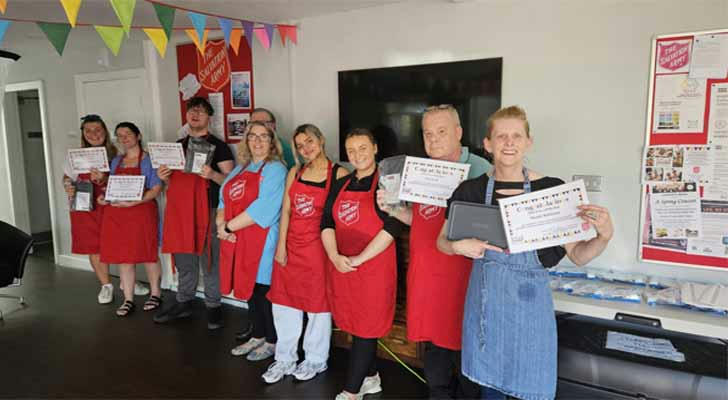The Salvation Army's Free Culinary Classes: Cooking Up Opportunities for Community Empowerment
In today’s fast-paced world, having culinary skills can significantly enhance personal life and open doors to various career opportunities. The Salvation Army has recognized this need and has initiated free culinary classes aimed at empowering individuals while providing essential cooking skills. These classes not only serve as a means to learn how to cook but also act as a pathway to greater economic stability and community engagement.

Understanding the Importance of Culinary Skills
The Value of Cooking Proficiency
Cooking is a fundamental life skill that allows individuals to prepare healthy meals, save money, and foster family connections. However, not everyone has access to resources or knowledge to develop these skills effectively. For many, particularly those in low-income households, learning to cook can lead to healthier eating habits and improved quality of life.
Creating Opportunities for Employment
In addition to personal health, culinary skills can lead to employment opportunities in the food industry. The demand for trained culinary professionals continues to grow, and providing individuals with the necessary skills can enhance their job prospects significantly. The Salvation Army’s culinary classes aim to equip attendees with skills that can lead to jobs in restaurants, catering companies, and other food service establishments.
The Salvation Army's Culinary Program
The Salvation Army's culinary classes are designed for individuals of all backgrounds, with a particular focus on those facing economic hardships. The program serves as both a training ground for aspiring cooks and a valuable resource for community members looking to improve their cooking abilities.
Class Structure and Content
1.Eight-Week Program: The culinary classes span eight weeks, offering a comprehensive curriculum that covers various cooking techniques, nutrition, and kitchen safety. This structured format allows participants to build their skills progressively.
2.Hands-On Cooking Experience: Participants engage in hands-on training where they learn to prepare a variety of dishes, ensuring they gain practical experience that builds confidence in the kitchen.
3.Nutritional Education: The courses emphasize the importance of nutrition, teaching participants how to prepare healthy meals that are budget-friendly. This knowledge empowers them to make informed dietary choices for themselves and their families.
4.Career Preparation: The program includes collaboration with local agencies to provide job placement assistance in the food and service industries upon graduation. This support helps participants transition smoothly into the workforce.
5.Certification: Upon successful completion of the program, students receive a certificate from the American Culinary Federation's ServSafe program, which is valid for four years. This certification is highly regarded in the food service industry and enhances employability.
Eligibility Requirements
To participate in the Salvation Army’s culinary classes, potential students typically need to meet certain eligibility criteria, including:
Age Requirement: Most programs target adults but may also welcome teens, providing they are accompanied by a guardian or responsible adult.
Financial Need: The program focuses on serving low-income individuals, so applicants may need to demonstrate financial need to secure a spot.
Community Engagement: The Salvation Army often seeks individuals who are willing to engage with the community and participate in events, further fostering a sense of belonging and support.
The Benefits of Free Culinary Classes
Enhancing Quality of Life
Access to free culinary classes offers numerous benefits, primarily enhancing participants' quality of life. By learning to cook, individuals can prepare nutritious meals for themselves and their families, fostering healthier lifestyles and combating food insecurity.
Building a Supportive Community
The classes create a sense of community among participants. Bonding over shared experiences and cooking together fosters relationships, making the learning environment enjoyable and supportive. These connections can be valuable for ongoing support and motivation.
Promoting Economic Empowerment
Equipping individuals with culinary skills promotes economic empowerment. Graduates of the program are better positioned to find employment in the food service industry, leading to financial stability. Moreover, those who complete the course often express enhanced self-esteem and the confidence to pursue further education or career advancement opportunities.
How to Get Involved
If you or someone you know could benefit from The Salvation Army's free culinary classes, consider reaching out to your local Salvation Army center. Many communities host these classes regularly, providing essential resources and training.
Registration Process
To register, interested individuals can typically visit the Salvation Army's website or contact their local branch directly for information on upcoming classes, schedules, and any necessary documentation. It’s essential to act quickly, as spots may be limited, and classes can fill up fast due to their popularity.
Conclusion
The Salvation Army’s free culinary classes are more than just cooking lessons; they represent a stepping stone toward greater opportunities and empowerment for individuals in the community.
By teaching essential cooking skills and fostering a supportive environment, the program not only benefits participants in their personal lives but also enables them to explore career paths that can lead to financial independence. With a structured eight-week program, valuable certifications, and job placement assistance, the Salvation Army is committed to helping individuals transform their lives through culinary education. Whether you’re looking to improve your culinary skills or seeking an opportunity to uplift others in the community, consider the impact of these classes and get involved today. Together, we can help create a healthier and more empowered community, one meal at a time.
